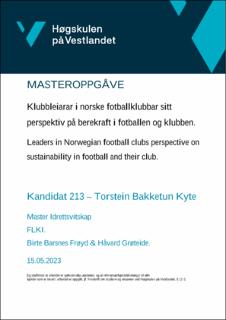| dc.description.abstract | This paper has explored leaders in Norwegian football clubs perspective on sustainability in football and their club.
It is a qualitative paper where one has interviewed six leaders in Norwegian football clubs, from different levels and with different job titles: CEO or Chief sustainability officer. They have been asked about sustainability in football, their club, on national and international level.
The main findings of this study were that all of them knew the term «sustainability», but they understood it quite differently to the definition in the Brundtland report from 1987. All the clubs worked with sustainability to various degrees. All the interviewees view sustainability as something football needs to get involved with. All of them think football needs to work with sustainability, but there are different views on what the motivation should be and what areas within the sustainability term one should focus on.
There was a consensus towards sustainability work, but some differences regarding how much each club had done and was planning to do. There were also some differences in the views on other clubs, the federations, and local and national authorities, where some were positive and others negative.
There were few noticeable differences in the views of the CEOs and the Chief sustainability officers. All six interviewees expressed different ideas and defined sustainability differently. Some focused on the Brundtland report definition, others the three themes within sustainability (environment, economics, and social matters) and some through the UNs sustainability goals. All the clubs had started their work in the last decade, but some had worked on similar projects earlier for different reasons. The clubs were at different stages of their projects. Some worked systematically, others more freely.
Each club had its own set of different challenges, and one does not think these findings are representative of all Norwegian clubs. The findings are relatively nuanced. With the interviewees choosing to join the study on their own volition, there is a possibility that the ones who joined are from clubs that work with sustainability and who would therefore be more interested in talking about their projects. On the other hand, there is evidence for at least a couple of more clubs working with sustainability and during the writing process the emergence of the Football for the Goals-project now means every professional club in Norway needs to work with sustainability.
The richness and nuance of the findings indicate there is more data to collect concerning sustainability and as projects like Football for the Goals emerge, the perspective of the leaders on sustainability might change. One believes there is room for more research on the topic. | en_US |

